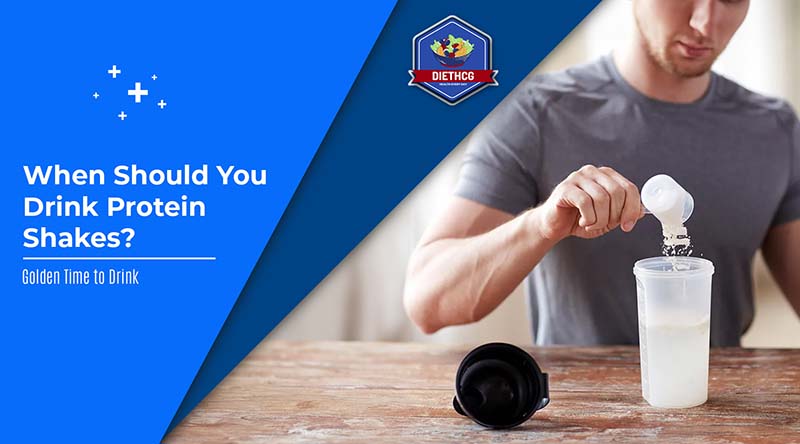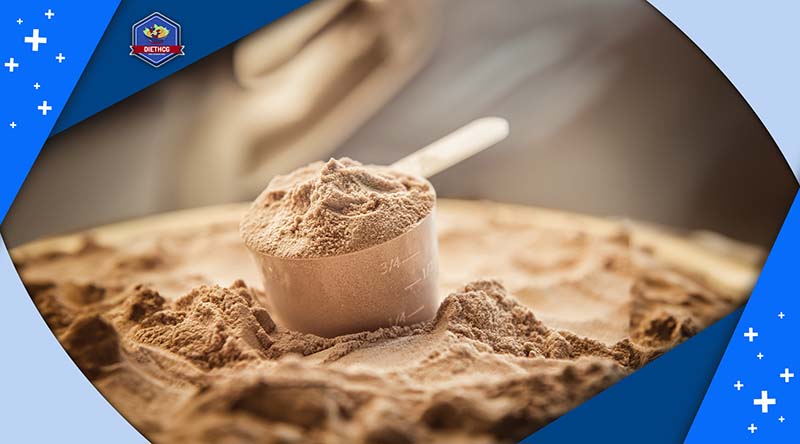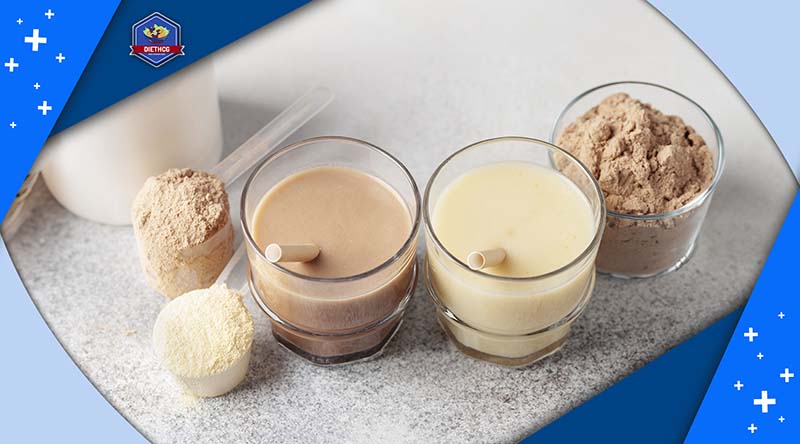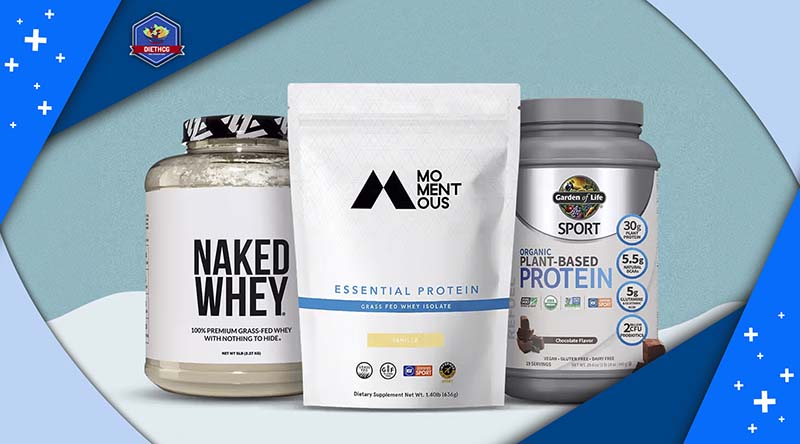Protein shakes are a popular supplement choice for individuals looking to enhance muscle growth and improve performance during exercise. The question arises: When should you drink protein shakes, before or after exercise or any other time?
Though it might seem simple to mix some powder with water or milk, there is scientific timing involved in consuming your protein shake to maximize its benefits.

1. What Is a Protein Shake?
A protein shake is a drink packed with protein, made by mixing a special high-protein powder with water, milk, or juice. Many brands are out there, but they usually have one thing in common: protein hydrosolates. These are proteins that are broken down, so your body can soak them up better than regular proteins.

Plus, these shakes often have extra amino acids and carbs, often sugary ones. Those sugars can boost insulin levels in your body, which helps turn protein into muscle—basically making your muscles grow. Amino acids are also important because they help your body make proteins faster.
2. The Role of Protein in Weight Control
Having a diet that’s rich in protein (around 20% of your energy intake or more) plays a significant role in managing weight through several key mechanisms:
- Increased Energy Expenditure: Consuming protein leads to a higher diet-induced thermogenesis, meaning your body burns more energy digesting protein compared to carbohydrates or fats. This results in an overall increase in energy expenditure throughout the day.
- Regulation of Blood Sugar: Protein helps regulate the body’s response to carbohydrates by blunting the rise in blood sugar levels after a meal. This also leads to a reduced insulin response, which helps prevent the storage of excess fat in adipose tissue.
- Enhanced Satiety: Protein has a greater satiating effect compared to carbohydrates or fats, meaning it helps you feel full and satisfied for longer periods. This can result in reduced calorie intake overall.
- Muscle Growth and Maintenance: Higher protein intake supports muscle protein synthesis, aiding in the maintenance and growth of lean muscle mass. This is crucial for weight management as muscle tissue burns more calories at rest compared to fat tissue.
3. The Benefits of Using Protein Shakes for Weight Loss
Protein shakes aren’t just for post-workout muscle repair and growth. Here are some additional perks they offer:
- Aid in Weight Loss: Protein shakes can be a helpful tool for weight loss. Since protein takes longer to digest compared to other nutrients, it helps you feel full for a longer time, reducing the likelihood of overeating.
- Maintain Muscle Mass in Older Adults: As people age, their bodies require more protein to maintain muscle mass. Older adults may find it challenging to meet their protein needs through food alone. Protein shakes provide a convenient way to supplement their protein intake, with a recommended daily intake of around 0.6 grams per pound of body weight.
- Support Wound Healing: Protein shakes containing whey protein can be beneficial for individuals recovering from injuries or preparing for surgery. Whey protein aids in the repair of the body’s tissues, facilitating the healing process.
- Convenience: Protein shakes offer a quick and convenient source of protein, making them suitable for busy lifestyles or when access to whole food sources is limited.

4. Potential Risks and Side Effects of Protein Shakes
While protein shakes can be beneficial when consumed as part of a balanced diet, certain individuals may experience the following side effects:
- Digestive Discomfort: Some people may experience gas, bloating, diarrhea, or cramps after consuming protein shakes, particularly those containing whey protein, if they are lactose intolerant. Large servings may also lead to constipation and nausea. Opting for nondairy protein shakes can help alleviate these symptoms.
- Allergic Reactions: Individuals with allergies to dairy-based proteins may experience allergic reactions, such as rashes, swelling, or a runny nose, upon consuming whey protein shakes.
- Potential Exposure to Toxins: Reports from the Clean Label Project have identified certain protein powders containing heavy metals, pesticides, and other toxins like mercury, lead, and arsenic. While the levels of these contaminants are unlikely to cause severe health effects when consumed in moderation, it’s still essential to be mindful of their presence and consume protein shakes in moderation.
5. How to Use Protein Powder Effectively for Weight Loss
Incorporating protein powder into your diet can be a smart strategy for weight loss. Here are some creative ways to use protein shakes or powders:
- Blend with Vegetables and Dip: Mix protein powder into vegetable-based dips for a nutritious snack option.
- Enhance Oatmeal or Yogurt: Add protein powder to your oatmeal or yogurt for a protein boost that keeps you feeling satisfied longer.
- Bake into Goods: Incorporate protein powder into baked goods like pancakes, bread, or muffins for a healthier twist on traditional recipes.
- Blend into Smoothies: Make a delicious smoothie by combining protein powder with fruit and yogurt for a filling and nutritious meal or snack.
- Create High-Protein Pudding: Whip up a high-protein pudding using protein powder as a key ingredient for a satisfying dessert option.
- Make Energy Balls or Bars: Combine protein powder with oats, nut butter, fruit, or a mixture of these ingredients to create homemade energy balls or bars for a convenient and nutritious snack on the go.
Using protein powder as part of a balanced diet and regular exercise routine is key for effective weight loss. Even if you’re not active, incorporating protein shakes into your diet can still help boost your protein intake. Just remember not to overdo it, as excessive protein consumption may contribute to weight gain.
6. Should You Drink Protein Shake Before or After Workout?
The answer may surprise you—both could be beneficial. According to a review, having high-quality protein, around 0.4–0.5 grams per kilogram of lean body mass, before and after exercising serves as a simple and generally effective guideline.
Another recent review published in the Journal of the International Society of Sports Nutrition suggested that the positive effects seen in timing studies might actually stem from an overall increase in protein intake rather than the timing itself. This indicates the need for further investigation into the matter.
Yet, according to the consensus of another study published by PeerJ, consuming protein either before or after a workout can contribute to muscle growth. The study mentioned, “The trainee is free to choose, based on individual factors such as preference, tolerance, convenience, and availability, whether to consume protein immediately pre- or post-exercise.” Essentially, as long as you’re meeting your protein needs throughout the day, the timing might not be crucial.

7. Should You Drink Protein Shakes When Hungry?
Yes, consuming protein shakes when feeling hungry can be an effective strategy for curbing hunger and meeting your nutritional requirements, particularly if you lead an active lifestyle or are working on managing your weight. Protein shakes offer a convenient and swift source of high-quality protein, often supplemented with essential vitamins and minerals. They can serve as a practical meal replacement option and help stave off hunger pangs.
However, it is necessary to maintain a balanced diet that incorporates whole foods for overall health. While protein shakes can help fulfill your hunger and dietary needs, they should complement—not replace—nutrient-rich whole foods. Additionally, consider the type of protein and the overall nutrient content of the shake to ensure it aligns with your dietary objectives.
8. Should You Mix Protein Shakes with Water or Milk?
The choice between mixing protein shakes with water or milk largely depends on your individual goals and taste preferences. Using water, which is calorie-free, promotes quicker absorption and digestion, making it a great option for those looking to cut calories or requiring fast recovery post-exercise. On the other hand, mixing your shake with milk can enhance muscle recovery and growth due to the additional calories, protein, and fats, while also providing a creamier texture that might be more palatable for some.

For individuals who are lactose intolerant or prefer vegan options, plant-based milks like almond, oat, or soy milk are excellent alternatives. Water might be the more convenient option for those looking to avoid the extra hassle of carrying milk to the gym or who prefer a lighter drink. Ultimately, the choice between water and milk for your protein shakes should align with your personal health objectives and taste preferences, and experimenting with both can help you find the best fit for your routine.
9. Exploring Various Types of Protein Shakes for Effective Weight Loss
There are various types of protein powders on the market, catering to different dietary needs, whether you’re looking for dairy-based or plant-based options.
- Whey Protein: This is a top choice among fitness enthusiasts. As a complete protein derived from milk, whey provides all essential amino acids your body can’t make itself. Notably, studies show whey protein can assist in weight loss by reducing body fat and suppressing appetite, thanks to its ability to lower levels of the hunger hormone ghrelin.
- Casein Protein: Also milk-based, casein is absorbed more slowly by the body, extending the feeling of fullness which can be beneficial for weight management. Though similar to whey in nutritional content, its slow digestion rate makes it ideal for a nighttime protein source, aiding muscle recovery as you sleep.
- Egg White Protein: A great alternative for those who avoid dairy, egg white protein is low in fat and carbs. While predominantly protein, it’s less effective in suppressing appetite compared to other sources. It’s best suited for those with specific dietary restrictions.
- Collagen: Increasingly popular, collagen supports not just skin health but also muscle mass when combined with strength training. Particularly beneficial for older adults, collagen has been shown to improve muscle strength and body composition with resistance training.
- Soy Protein: An excellent plant-based option, soy protein is a complete protein suitable for vegans and vegetarians. It offers additional health benefits, such as reducing menopausal symptoms and potentially lowering risks of heart disease and breast cancer. Studies have also linked soy protein with weight loss and decreased body fat.
- Brown Rice Protein: For those avoiding animal products, brown rice protein is a viable option, though it’s not complete in amino acids and should be paired with other protein sources. Research indicates its effectiveness in muscle recovery and growth parallels that of whey protein.

Incorporating these protein powders into your diet depends on your health goals, dietary preferences, and any intolerances or allergies. Experimenting with different types can help you find the best fit for your lifestyle and fitness objectives.
10. Important Factors to Consider When Choosing Protein Powder
Selecting the right protein powder involves weighing several key factors. Here are the most crucial ones to keep in mind:
- Protein Content: Look for a powder with a substantial protein content per serving, ideally around 20 grams or more, to effectively support your dietary and fitness goals.
- Type of Protein: Consider different types such as whey, casein, soy, or pea protein, each offering unique benefits. Choose one that aligns with your preferences, dietary requirements, and fitness objectives.
- Additives and Ingredients: Opt for protein powders with minimal additives and ingredients to avoid potential health risks associated with artificial sweeteners, flavors, or preservatives.
- Price: While cost is a factor, prioritize value over the cheapest option. Balance affordability with quality to ensure you’re investing in a protein powder that meets your nutritional needs.
- Allergies and Intolerances: Check for allergens or intolerances to certain ingredients, and opt for protein powders that are free from those substances to avoid adverse reactions.
- Brand Reputation: Choose products from reputable brands with a track record of producing high-quality, safe, and effective supplements to ensure you’re getting a reliable product.
- Taste and Texture: Consider personal preferences regarding taste and texture, as enjoying the flavor and consistency of your protein powder can enhance regular consumption and adherence to your dietary regimen.
11. How Much Protein Should Women Consume Daily for Weight Loss?
For women aiming for weight loss while preserving lean body mass, the recommended daily protein intake falls between 1.6 to 2.2 grams per kilogram of body weight (0.73 to 1 gram per pound). However, for athletes or individuals engaging in intense exercise, the protein requirement may increase to 2.2-3.4 grams per kilogram (1-1.5 grams per pound) to support muscle maintenance during weight loss efforts.

Consider personal factors such as age, gender, activity level and overall health when determining the appropriate amount of protein for weight loss. Consulting with a healthcare provider or registered dietitian can provide personalized nutrition recommendations tailored to individual needs.
In general, women seeking weight loss should aim to consume adequate protein within the recommended ranges while paying attention to their unique circumstances and seeking professional guidance when necessary.
12. Conclusion
In conclusion, understanding ‘When Should You Drink Protein Shakes‘ is key to maximizing your weight loss efforts. By incorporating protein shakes strategically into your daily routine, you can support muscle preservation, curb hunger, and enhance overall results. We hope this blog has provided you with valuable insights and actionable tips to optimize your protein intake for success. We’d love to hear your thoughts and experiences – feel free to share your stories and feedback with us! And don’t forget to check out more informative blogs from DietHCG for additional guidance on your health and wellness journey. Stay tuned for more helpful content to support your goals.


